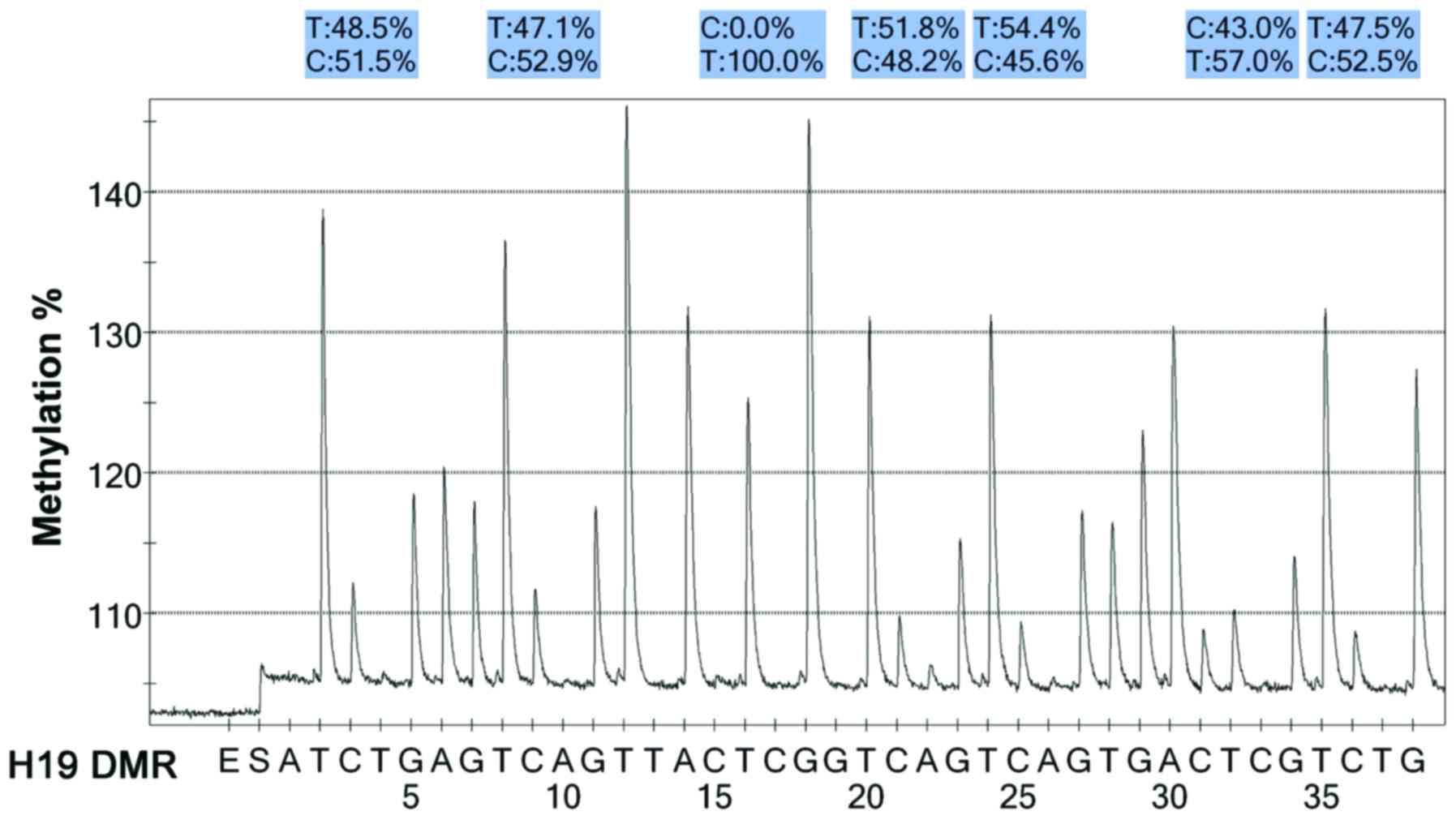|
1
|
McCullough LE, Miller EE, Calderwood LE,
Shivappa N, Steck SE, Forman MR, Mendez A M, Maguire R, Fuemmeler
BF, Kollins SH, et al: Maternal inflammatory diet and adverse
pregnancy outcomes: Circulating cytokines and genomic imprinting as
potential regulators? Epigenetics. 12:688–697. 2017. View Article : Google Scholar : PubMed/NCBI
|
|
2
|
Kusinski LC, Cooper WN, Sandovici I and
Constância M: Contribution of placental genomic imprinting and
identification of imprinted genesThe Guide to Investigation of
Mouse Pregnancy. Croy A, Yamada AT, DeMayo FJ and Adamson SL:
Academic Press; Cambridge, MA, USA: pp. 275–284. 2014, https://doi.org/10.1016/B978-0-12-394445-0.00023-0
View Article : Google Scholar
|
|
3
|
Ollikainen M, Smith KR, Joo EJ, Ng HK,
Andronikos R, Novakovic B, Aziz Abdul NK, Carlin JB, Morley R,
Saffery R, et al: DNA methylation analysis of multiple tissues from
newborn twins reveals both genetic and intrauterine components to
variation in the human neonatal epigenome. Hum Mol Genet.
19:4176–4188. 2010. View Article : Google Scholar : PubMed/NCBI
|
|
4
|
Wianny F, Blachère T, Godet M, Guillermas
R, Cortay V, Bourillot PY, Lefèvre A, Savatier P and Dehay C:
Epigenetic status of H19/IGF2 and SNRPN imprinted genes in
aborted and successfully derived embryonic stem cell lines in
non-human primates. Stem Cell Res (Amst). 16:557–567. 2016.
View Article : Google Scholar
|
|
5
|
Zhu JQ, Si YJ, Cheng LY, Xu BZ, Wang QW,
Zhang X, Wang H and Liu ZP: Sodium fluoride disrupts DNA
methylation of H19 and Peg3 imprinted genes during the early
development of mouse embryo. Arch Toxicol. 88:241–248. 2014.
View Article : Google Scholar : PubMed/NCBI
|
|
6
|
Feng Y and Rudensky AY: DNA methylation
secures CD4(+) and CD8(+) T cell lineage borders. Nat Immunol.
16:681–683. 2015. View
Article : Google Scholar : PubMed/NCBI
|
|
7
|
Sasheva P and Grossniklaus U:
Differentially methylated region-representational difference
analysis (DMR-RDA): A powerful method to identify DMRs in
uncharacterized genomes. Methods Mol Biol. 1456:113–125. 2017.
View Article : Google Scholar : PubMed/NCBI
|
|
8
|
Verloes A, Spits C, Vercammen M, Geens M,
LeMaoult J, Sermon K, Coucke W and Van de Velde H: The role of
methylation, DNA polymorphisms and microRNAs on HLA-G expression in
human embryonic stem cells. Stem Cell Res (Amst). 19:118–127. 2017.
View Article : Google Scholar
|
|
9
|
Ihle MA, Fassunke J, König K, Grünewald I,
Schlaak M, Kreuzberg N, Tietze L, Schildhaus HU, Büttner R and
Merkelbach-Bruse S: Comparison of high resolution melting analysis,
pyrosequencing, next generation sequencing and immunohistochemistry
to conventional Sanger sequencing for the detection of p.V600E and
non-p.V600E BRAF mutations. BMC Cancer. 14:132014. View Article : Google Scholar : PubMed/NCBI
|
|
10
|
White HE, Durston VJ, Harvey JF and Cross
NC: Quantitative analysis of SNRPN (correction of SRNPN) gene
methylation by pyrosequencing as a diagnostic test for Prader-Willi
syndrome and Angelman syndrome. Clin Chem. 52:1005–1013. 2006.
View Article : Google Scholar : PubMed/NCBI
|
|
11
|
Irahara N, Nosho K, Baba Y, Shima K,
Lindeman NI, Hazra A, Schernhammer ES, Hunter DJ, Fuchs CS and
Ogino S: Precision of pyrosequencing assay to measure LINE-1
methylation in colon cancer, normal colonic mucosa, and peripheral
blood cells. J Mol Diagn. 12:177–183. 2010. View Article : Google Scholar : PubMed/NCBI
|
|
12
|
Ahmadian A, Ehn M and Hober S:
Pyrosequencing: History, biochemistry and future. Clin Chim Acta.
363:83–94. 2006. View Article : Google Scholar : PubMed/NCBI
|
|
13
|
Barbaux S, Erwich JJ, Favaron PO, Gil S,
Gallot D, Golos TG, Gonzalez-Bulnes A, Guibourdenche J, Heazell AE,
Jansson T, et al: IFPA meeting 2014 workshop report: Animal models
to study pregnancy pathologies; new approaches to study human
placental exposure to xenobiotics; biomarkers of pregnancy
pathologies; placental genetics and epigenetics; the placenta and
stillbirth and fetal growth restriction. Placenta. 36 Suppl
1:S5–S10. 2015. View Article : Google Scholar : PubMed/NCBI
|
|
14
|
Bliek J, Alders M, Maas SM, Oostra RJ,
Mackay DM, van der Lip K, Callaway JL, Brooks A, van't Padje S,
Westerveld A, et al: Lessons from BWS twins: Complex maternal and
paternal hypomethylation and a common source of haematopoietic stem
cells. Eur J Hum Genet. 17:1625–1634. 2009. View Article : Google Scholar : PubMed/NCBI
|
|
15
|
Yamazawa K, Kagami M, Fukami M, Matsubara
K and Ogata T: Monozygotic female twins discordant for
Silver-Russell syndrome and hypomethylation of the H19-DMR.
J Hum Genet. 53:950–955. 2008. View Article : Google Scholar : PubMed/NCBI
|
|
16
|
Loke YJ, Galati JC, Morley R, Joo EJ,
Novakovic B, Li X, Weinrich B, Carson N, Ollikainen M, Ng HK, et
al: Association of maternal and nutrient supply line factors with
DNA methylation at the imprinted IGF2/H19 locus in multiple
tissues of newborn twins. Epigenetics. 8:1069–1079. 2013.
View Article : Google Scholar : PubMed/NCBI
|
|
17
|
Williams-Wyss O, Zhang S, MacLaughlin SM,
Kleemann D, Walker SK, Suter CM, Cropley JE, Morrison JL, Roberts
CT and McMillen IC: Embryo number and periconceptional
undernutrition in the sheep have differential effects on adrenal
epigenotype, growth, and development. Am J Physiol Endocrinol
Metab. 307:E141–E150. 2014. View Article : Google Scholar : PubMed/NCBI
|
|
18
|
Hoyo C, Fortner K, Murtha AP, Schildkraut
JM, Soubry A, Demark-Wahnefried W, Jirtle RL, Kurtzberg J, Forman
MR, Overcash F, et al: Association of cord blood methylation
fractions at imprinted insulin-like growth factor 2 (IGF2), plasma
IGF2, and birth weight. Cancer Causes Control. 23:635–645. 2012.
View Article : Google Scholar : PubMed/NCBI
|
|
19
|
Petry CJ, Seear RV, Wingate DL, Acerini
CL, Ong KK, Hughes IA and Dunger DB: Maternally transmitted foetal
H19 variants and associations with birth weight. Hum Genet.
130:663–670. 2011. View Article : Google Scholar : PubMed/NCBI
|















